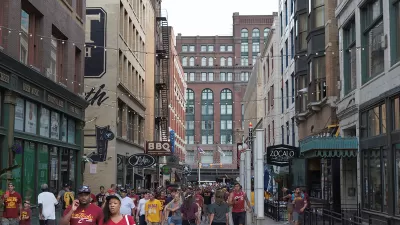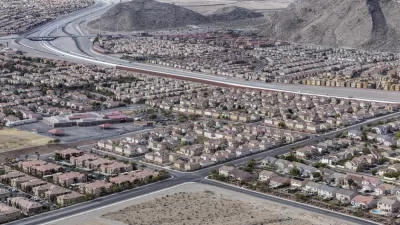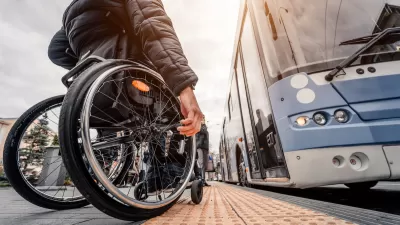A new study assesses which cities have the broadest access to walkable neighborhoods.

Urban planners frequently tout the benefits of walkability. But as Kea Wilson explains in Streetsblog USA, for many households, walkable neighborhoods just aren’t affordable. A new study sheds light on how walkability interacts with affordability. “Perhaps unsurprisingly, the researchers found that Americans on the whole will pay significantly more for the privilege of living in a place where they can get around on their own power: specifically, 35 percent more for home buyers, 41 percent more for apartment renters, and 44 percent more for office properties.”
According to an analysis from Smart Growth America, the city with the most equitable walkability in the United States is Cleveland, Ohio. According to Michael Rodriguez, visiting director of research at SGA, “Cleveland was at one point the fourth largest city in the U.S., and if you look at old images and videos of it, it was [as] vibrant as midtown Manhattan. These were proper cities, and we chose to enact policies that decimated that — but whatever we have left still provides a core of walkability today.”
“Perhaps shockingly, notoriously expensive New York City actually ranked second on the Social Equity Index, which he attributes to its proportionally high median incomes, astounding diversity, and the sheer preponderance of transit and people-oriented places that make car-free living possible for virtually everyone; residents of Manhattan, after all, spend an average of 37 percent of their income on housing and transportation combined, while residents of car-oriented Indianapolis spend 42, according to the Housing and Transportation Index.”
Wilson admits that New York City is an outlier, a megacity with many wealthy residents, but argues that equitable access to walkable communities shouldn’t be an anomaly. It could be part of every city if more effort was made to “implement zoning reforms, foster non-automotive travel, and invest in affordable housing for all.”
FULL STORY: America’s Most Equitably Walkable City is … Cleveland?

Maui's Vacation Rental Debate Turns Ugly
Verbal attacks, misinformation campaigns and fistfights plague a high-stakes debate to convert thousands of vacation rentals into long-term housing.

Planetizen Federal Action Tracker
A weekly monitor of how Trump’s orders and actions are impacting planners and planning in America.

San Francisco Suspends Traffic Calming Amidst Record Deaths
Citing “a challenging fiscal landscape,” the city will cease the program on the heels of 42 traffic deaths, including 24 pedestrians.

Defunct Pittsburgh Power Plant to Become Residential Tower
A decommissioned steam heat plant will be redeveloped into almost 100 affordable housing units.

Trump Prompts Restructuring of Transportation Research Board in “Unprecedented Overreach”
The TRB has eliminated more than half of its committees including those focused on climate, equity, and cities.

Amtrak Rolls Out New Orleans to Alabama “Mardi Gras” Train
The new service will operate morning and evening departures between Mobile and New Orleans.
Urban Design for Planners 1: Software Tools
This six-course series explores essential urban design concepts using open source software and equips planners with the tools they need to participate fully in the urban design process.
Planning for Universal Design
Learn the tools for implementing Universal Design in planning regulations.
Heyer Gruel & Associates PA
JM Goldson LLC
Custer County Colorado
City of Camden Redevelopment Agency
City of Astoria
Transportation Research & Education Center (TREC) at Portland State University
Jefferson Parish Government
Camden Redevelopment Agency
City of Claremont





























